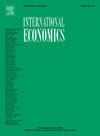The fiscal multiplier when debt is denominated in foreign currency
引用次数: 0
Abstract
In this paper, we show that the proportion of private debt denominated in foreign currency can be a determinant of the size of the domestic fiscal multiplier. The demonstration relies on a two-country New Keynesian DSGE model with nominal rigidities and financial frictions. In line with recent evidence, the model can reproduce the depreciation of the domestic currency following an increase in public spending. We show that, in this case, the increase in debt burden denominated in foreign currency deteriorates the domestic firms’ balance sheets. This raises their external finance premium and crowds out private investment, ultimately offsetting the stimulative effect of the government spending shock.
债务以外币计价时的财政乘数
在本文中,我们证明了以外币计价的私人债务的比例可以是国内财政乘数大小的决定因素。该论证依赖于一个具有名义刚性和金融摩擦的两国新凯恩斯DSGE模型。与最近的证据一致,该模型可以再现公共支出增加后本币贬值的情况。我们表明,在这种情况下,以外币计价的债务负担的增加恶化了国内企业的资产负债表。这提高了它们的外部融资溢价,挤出了私人投资,最终抵消了政府支出冲击的刺激作用。
本文章由计算机程序翻译,如有差异,请以英文原文为准。
求助全文
约1分钟内获得全文
求助全文
来源期刊

International Economics
Economics, Econometrics and Finance-Economics, Econometrics and Finance (all)
CiteScore
6.30
自引率
0.00%
发文量
74
审稿时长
71 days
 求助内容:
求助内容: 应助结果提醒方式:
应助结果提醒方式:


